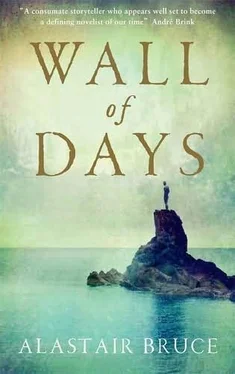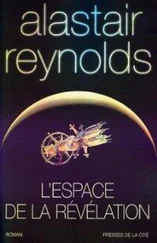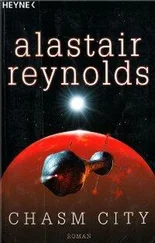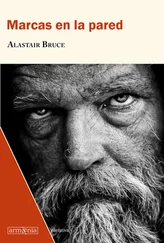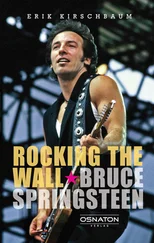I remember her standing at the shore looking after me. I remember her standing at the gate of the town, held by burly soldiers, as a fist hit me in the face. I can taste her fear. It sickens me.
And I remember Abel. I remember the night before I was arrested the first time. I remember my hand around his throat. His hoarse, harsh words, my stomach torn in two. I remember his words and my realisation that it was him, that it was all him. I remember him slumped in the chair as I left, staring after me but with eyes blazing, triumphant.
I struggle still to see the sense in it, to see the rightness of it.
I remember him in the hall three weeks ago. The same expression on an older face. The anger, the righteousness, the incomplete answers. I think back to Jura’s glances to the side, the closed doors, dropped eyes, shadows in the streets. Abel all the time, pulling the strings.
A man with a vision of a new world. I trained him well. A new world with no space for the old, no space for shadows.
What did it take to order the death of Tora? At which point was it decided: my return, her letter, her word to me from behind the locked door, her compassion for me, or was it simply my presence, my refusal to disappear?
I wonder how it happened. Did a crowd of men approach with blazing torches and strong wills? Did they shout out at her? And what did they do to her? The concubine of the hated. Did they punch her?
Threaten her? And when she was strung up did she cry out? I think not. I think she would have looked at the people with scorn. Brave to the end.
Perhaps she asked to go with me.
A new world, beginning like the old with a murder. The anchoring sin.
He was wrong. You can kill a ghost.
I go back to the field of stone. I stand in the middle with them all around me. They rise up again. I am in a fog of the dead. This is where they belong now. This is home.
I think of the town. It sleeps now I feel. I can hear the crickets, smell the smoke, taste the oranges. I can see Amhara running through the streets, disappearing into the shadows, Elba calling after her. I see Elba sitting, her back to me, hunched over at a table. Her friend is buried.
The curtains are drawn, the house unknown to me.
I see the bodies in their graves, their bones yellow now.
What have they told Amhara about her mother?
Elba sits at the table, day after day, crying silently.
There are too many dead.
Amhara runs through the streets, her mother under the earth, the ghost of her father watching over her. The father she never knew.
Though she sensed something I think. The way she looked at me when she took my hand.
She runs through the streets, runs headlong into the walls of the town, over and over again. She feels for cracks in the wall, ignoring the splinters. The streets she runs through and beyond the walls, the plains, the oceans: a small world soaked in blood. Dirty. But it is something.
She makes it something. It is perhaps more than we deserve. More than I deserve.
I see her again. I am with her this time. Her and her mother.
We are out on the vast plains beyond the gates of Bran. We are caught in a snowstorm. Our heads are down. I lead my wife and our daughter to a ravine out of the worst of the snow. I wrap my arms around them and my breath warms their hands. I shelter them from the cold.
There is a sudden breeze. I am on the island again, wet through.
I go back to the woods. There it is as quiet as it always was. As quiet as I remember. The chippings line the floor, still yellow and smelling of pine, as if I was here just a few moments ago. I look behind me, over my shoulder. I remember seeing Andalus, the last time I did that, sitting there on the tree stump, staring at me, staring at my back. I run my hand over the bark. It is sticky with resin.
I could sail to Axum. Seek him out. Tell my story there. But I know that will not happen. They cannot give me what I want.
It takes me a few hours to chop the wood and with it I dry out the cave. I arrange my possessions on the stone shelves. I catch a fish and haul the boat high up the shore. I don’t know what to do with it. I do not need it to catch fish and I will not be going anywhere. Yet I don’t want to dismantle it just yet. There is something about that, something that I cannot face. For now it must stay on the beach.
I wake several times during the night. In the morning I eat cold fish while I sharpen my blade. The spade has gathered some rust. Things weather quickly here.
I push the door open and a cold gust hits me. The island is cooler than I remember. I pull my coat closer and set off down the hill.
I smell the grasses, feel the wet strands brush against my skin, soaking me. My spade I sling over my shoulder. The soft rain trickles down the shaft and down my back. I shiver.
I think when I am out there, down in the sea of wet grass, I think. I realise why I have never planted crops, why I have never cultivated the grasses and roots to ensure a more plentiful supply. I did not plan on staying forever. Through my ten years in exile I was always going to go back. I just did not know it. The inevitability of guilt.
Soon I am at work slicing into the turf. The water running down my back changes from rain to sweat. I take off my coat, laying the spade in the bog. I watch as steam rises from my skin. I feel a tightness in my chest. It has not taken very long for me to lose strength and fitness. I look at my forearms. The veins bulge. I see the same skin, the same moles, the same scars that have been with me for so many years.
It is like I am doing it in slow motion when it happens. I have drawn the spade above my shoulders. I know precisely where I need to cut. I throw it down into the peat and water from the spade flies off into my face, into my eyes and the blade cuts through water and into something that straight away I know isn’t peat. I fling the spade from me onto dry ground and drop to my knees. I reach both hands into the water and feel around in it and close the thing in my hands and draw it out, the water pouring from it in torrents down its forehead, through its eyes and nostrils, mud slaking off its cheeks. It all comes out as easily as that. I reach into the water. My one hand finds a head, the other an arm and I pull and the torso lifts free of the water like a child drowned and the water pours from it. There is too much water in the body.
I lay it on the grass. My heart is beating wildly. The body is complete.
The spade has sliced through part of its shoulder but everything is there: limbs, hands, head. The body is brown, the colour of peat. It has hair, stained reddish-brown, again the colour of peat. Round its neck is a noose of some kind.
I stare at the man. There is only the noise of gulls. And then he moves. Or rather the eye does. An eyelid slides partly open. I jump to my feet and there’s a scream and it can only have come from me but I do not realise I make it at the time. The eyelid reveals an eyeball, yellowish white in colour with a black iris. It stares at the rain. I catch myself peering closer at the face and waving my hand in front of it.
Stupid, I think to myself. It is just the action of the rain, the trauma of being forced from the silt, the new angle of the head. The other eyelid remains closed, seemingly welded to the cheek. As I continue looking I see something else. There is a thin line across his throat reaching from one side of his neck to the other.
How did this man die? I wonder. The noose or the knife? Perhaps the noose first then the knife for good measure, or the other way round.
I look closer at his neck. It is hard to say. The noose is thin, quite flimsy, it could even be a necklace – decoration, not a murder weapon. But then the slightest thing can kill a man.
Читать дальше
